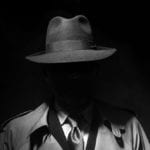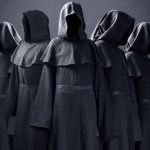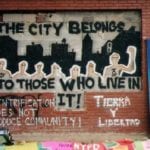 Animals
Animals  Animals
Animals  Movies and TV
Movies and TV 10 Box Office Bombs That We Should Have Predicted in 2025
 History
History 10 Extreme Laws That Tried to Engineer Society
 History
History 10 “Modern” Problems with Surprising Historical Analogs
 Health
Health 10 Everyday Activities That Secretly Alter Consciousness
 History
History Top 10 Historical Disasters Caused by Someone Calling in Sick
 Animals
Animals 10 New Shark Secrets That Recently Dropped
 Movies and TV
Movies and TV 10 Forgotten Realities of Early Live Television Broadcasts
 Technology
Technology 10 Stopgap Technologies That Became Industry Standards
 Weird Stuff
Weird Stuff 10 Wild Facts About Taxidermy That You Probably Didn’t Know
 Animals
Animals The Animal Kingdom’s 10 Greatest Dance Moves
 Movies and TV
Movies and TV 10 Box Office Bombs That We Should Have Predicted in 2025
 History
History 10 Extreme Laws That Tried to Engineer Society
Who's Behind Listverse?

Jamie Frater
Head Editor
Jamie founded Listverse due to an insatiable desire to share fascinating, obscure, and bizarre facts. He has been a guest speaker on numerous national radio and television stations and is a five time published author.
More About Us History
History 10 “Modern” Problems with Surprising Historical Analogs
 Health
Health 10 Everyday Activities That Secretly Alter Consciousness
 History
History Top 10 Historical Disasters Caused by Someone Calling in Sick
 Animals
Animals 10 New Shark Secrets That Recently Dropped
 Movies and TV
Movies and TV 10 Forgotten Realities of Early Live Television Broadcasts
 Technology
Technology 10 Stopgap Technologies That Became Industry Standards
 Weird Stuff
Weird Stuff 10 Wild Facts About Taxidermy That You Probably Didn’t Know
10 Times Members of Secretive Societies and Organizations Spilled the Beans
Prince Harry has finally published his long-awaited memoir, Spare, and as one can expect from anything slathered with royal honey, it’s selling like hotcakes. The book is supposed to tell his side of the story, how his family’s rule has shaped him, his time at war, and his well-documented exit from royalty hand in hand with his polarizing American wife.
For Harry, there was likely an incredible financial incentive and the promise of riches that would probably have never come had he remained a backup to the throne his entire life. His story proves that every so often, a person is scorned by an organization they were once part of and even loved, only to turn their backs against that very institution, telling their story and outing secrets that were never meant for the public eye.
Here are ten examples of members of secret societies who have spilled the beans.
Related: Top 10 Things Possibly Hidden In The Vatican Secret Archives
10 John Robison—Freemasons
A scientist with a long-established reputation in the British scientific community, John Robison was also a professor at Edinburgh University and an authority on mathematics and optics. In the late 1700s, Robison was also the author of Proofs of a Conspiracy against all the Religions and Governments of Europe, a book about the reach of the Freemasons. In particular, it focused on a Masonic cell—a source of hundreds and thousands of ominous conspiracy theories—the Illuminati. As a Mason himself, he had insider information about the workings of the organization and wrote about it all. As you might expect, the first edition sold out shortly after release and was published many times after that.
From Edinburgh, he witnessed the fall of the French monarchy and the dispossessing of the church as well as the entire French Revolution. This, he subsequently blamed on the Freemasons, suggesting that all the agents involved in the revolution were mere pawns in a much bigger game with ambitious ends.[1]
9 Ed Decker—Mormon Church
Born in 1935, Ed Decker was a member of the Church of Jesus Christ of Latter-Day Saints (or LDS Church) before he became a prominent member of the Christian group for ex-Mormons called Saints Alive in Jesus. Considered one of the most influential people with regard to the Mormon Church, Decker (in collaboration with Dave Hunt) penned a book known as The God Makers in which he exposed the inner workings of the church.
Decker’s relationship with the Mormon Church waned when he was exposed to the beliefs of other groups critical of Mormonism. He decided he could no longer live according to the premise that its founder, Joseph Smith, was called upon by God to restore pure Christianity to the world.[2]
8 Stetson Kennedy—the KKK
Stetson Kennedy, a writer who documented life in the Depression era, produced a book showcasing the inner mechanisms of the notorious Ku Klux Klan. The work he was most known for, a book known as The Klan Unmasked, which hit the shelves in 1954, was set in motion in the 1940s when he set himself the goal of exposing the organization and its efforts to terrorize black citizens in the region.
In this book, he exposed many things that were not known to the public before then, like their folklore, secret handshakes, and passwords, as well as mocking their white sheet attire. With evidence collected from the grand dragon himself, he provided the IRS with enough information to press for collecting a $685,000 tax lien from the Klan. He also provided assistance with the drafting of a brief used by the state of Georgia to revoke the Klan’s national corporate charter and also testified in other Klan-related cases. Kennedy passed away at the age of 94 after decades of tormenting Klansmen.[3]
7 Heinrich Himmler—Nazis
The architect of the Holocaust, the right-hand man of Adolf Hitler himself, kept a diary. Diaries kept by Himmler, compiled by Himmler’s assistant, covered most of the war and were discovered in 2013. Although Himmler did not technically “spill the beans,” as the title of the article suggests, they do provide a sobering account of one of history’s most vile men.
The diaries include over a thousand pages documenting day-to-day life, executions of Nazi-allied officers in Poland who refused to fight, and other details all the way to the Final Solution. They add depth to the understanding of Himmler’s character and the atrocious acts he gave the order for. One particular such order was to equip Auschwitz concentration camp with new guard dogs that could rip the prisoners apart. The diaries are personal and do not give insight into his emotional well-being or his relationships, but is that really necessary?[4]
6 Jeannie Mills—People’s Temple
Jeannie Mills, her husband Al, and their two children left the People’s Temple in 1974. Previously known as Elmer and Deanna Mertla, they rose to positions of responsibility within the ranks of the church, with Deanna serving as the head of the Temple’s publication office and Elmer as their official photographer. After they left the church, the husband and wife pairing became two of the most vocal critics, also founding the Human Freedom Center, which acted as a refuge for other defectors from the temple. After the Jonestown tragedy, the center offered itself as a place to go for survivors.
In February 1980, the couple, along with their daughter (15 years old at the time), were murdered in their home in Berkley, igniting rumors that a death squad made up of previous members of the church had taken their lives. Evidence later showed that the sole survivor of the ordeal, their son Eddie Mills, was perhaps not as innocent as initially suggested, quelling some fears about the church death squads.[5]
5 Leah Remini—Scientology
Known for her supporting role in the popular sitcom King of Queens, Leah Remini was also a member of the Church of Scientology. Brought into the church at the young age of eight when her mother converted, Remini’s decision to leave the church ultimately came down to her own nine-year-old daughter. One month after her exit from the group, Remini filed a missing person’s report for Scientology leader David Miscavige’s wife, Shelly, who has not been seen since 2007.
Since then, she has been an active opponent of the ideologies of the church and throws her weight behind cases against its members. She also produced a show about the inner workings of the religion called Leah Remini: Scientology and the Aftermath.[6]
4 India and Catherine Oxenberg—NXIVM
Catherine and her daughter India signed up for NXIVM classes that were advertised as workshops to develop their entrepreneurial skills. It was at these workshops that India was recruited into a secret society within the organization, which ultimately ruined her relationship with her mother. It took the pair seven years to free themselves from the sex cult. Catherine eventually penned a memoir about her experience trying to save her daughter from the cult-like group to no avail.
India eventually saw the folly in her ways. The group founder, Keith Raniere, was found guilty of racketeering, sex trafficking, and possession of child pornography in connection with the group.[7]
3 Janja Lalich—Democratic Workers Party
The Democratic Workers Party (DWP) was created in the U.S. in the 1970s by a collective of women led by Marlene Dixon. The party was one of the more controversial attempts to create a Marxist-Leninist party in the U.S., which championed sectarianism toward the forces on the left. The organization disbanded in 1985, but not before establishing a cult-like following for their primitive conception of Leninism and the Leninist party.
One of the party members and defectors, Janja Lalich, joined the DWP and was exposed to a range of strange requests and rules by which the party controlled her income and cut her off from her family entirely. She was ordered to pick a name and burn her belongings and was taken to book for spending time with her dying mother. Lalich has since become a sociologist and writer and has written numerous books about cults and coercion, exposing how these organizations work and recruit.[8]
2 Joe Valachi—The Mafia (aka Cosa Nostra)
Joe Valachi, an American gangster who turned state informer in 1962, held a high rank in the Mafia, equivalent to that of sergeant, and was a member of the Lucky Luciano’s mob family. Convicted of drug-related charges and sentenced to prison, Valachi received the promise of death from Vito Genovese. In a flat panic, Valachi killed a fellow prisoner in paranoia-induced rage, then opened up about the entire organization to the U.S. Bureau of Narcotics and Dangerous Drugs, the FBI, the Department of Justice, and the U.S. Senate in retaliation to the death threats he received.
Considered one of the most influential informants in organized crime history, Valachi was on a mission to destroy the underworld that had betrayed him and put a $100,000 bounty on his head. He had lost his wife and his mob family, and consumed with guilt, he relied on government protection to keep him alive until his final days when a heart attack finally killed the rat.[9]
1 Carlos Lehder—Medellín Drug Cartel
Lehder, who dipped his toes into the criminal underbelly by smuggling stolen cars into Canada and the American East Coast, which led to his incarceration, quickly made friends with the wrong people. He soon became a key player in the cocaine import business, persuading Goerge Jung to use planes to transport the drugs. Fast forward a few years when Lehder had worked his way up the ranks of the Medellín cartel, where he fell out of favor with the notorious Pablo Escobar. He was arrested shortly after that and sentenced to life in prison.
Authorities agreed to reduce Lehder’s jail term on the condition that he testify against former Panamanian leader Manuel Noriega, who had ties with the Medellín cartel and allowed them to ship cocaine through Panama. Lehder was placed under witness protection and eventually released from prison after serving his reduced sentence. He was deported to Germany, where he held citizenship through his father.[10]








